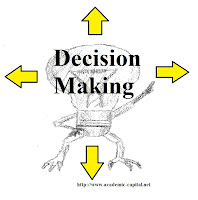We chronically evaluate others to determine status
as a friend or foe. When such decisions are made on superficial information
this can create large problems for organizations that push and promote those
who were favored by their environment versus their skills. The same concept can apply to companies that
look at grade point average for recruiting without looking at the difficulty of
earning that grade. Research by Swift et. al. (2013) delves into how these
superficial decisions are made and how they can impact corporate recruiting.
Research has indicated that the majority of
employers look at a candidates GPA without delving into the difficulty of
obtaining those grades thereby limiting their recruiting potential. For example,
a student who obtains an easy A without having to work for it is not inherently
better than a student who earns a C from a school with high standards. One
could make the argument that the student with an A is likely to be less
prepared for success or failure than the one who received a more accurate C and
understands a need for constant improvement.
The attribution error is so common that it is
difficult for employers to overcome anecdotal evidence to make solid decisions.
Primarily it is a problem of assuming that the level of performance in one
setting will translate into the same performance in another setting and that
performance is based upon personal attributions. They are unable to view the
important aspects of the situation and the inclusion of personality in the
final performance outcome. In other
words, they simply make a surface assumption with no deeper analytical thought
process.
Lewin’s attribution equation is Behavior =
Disposition + Situation. Behavior as
seen in terms of performance would be based on both a person’s disposition as
well as their situation. When attributes
are situational but contributed to disposition there is a problem in the recruitment
process. For example, is one CEO better than another only because they play cricket
or maintained performance in an upward moving company? One could make the
argument that the CEO who doesn’t play much golf but who was able to turn
around a poor running company is the higher performer (i.e. Lee Iacocca).
The researchers Swift, et. al (2013) used four
studies to test the concept fundamental attribution errors in varying
situations. They found that attribution
errors are a fundamental problem across a number of arenas with experienced
professions. They also found that employees who performed well in favorable
(easy) situations, or students earned high grades in colleges with high grade
distributions, were more likely rated as superior performers.
Performance measures can be accurate or inaccurate.
At times performance measures can create structural bias that masks superior
performance in difficult situations while enhancing mediocre performance in
ideal situations. The results are perceptual based upon the information
available to the professional making decisions to hire, promote, or admit. Yet
even when situational information is known the far majority of professionals do
not discount ease of performance attainment creating a bias in their hiring
practices.
The questions becomes do we make these types of
errors throughout life? Absolutely! Whether we are discussing children in
school, CEO’s, or people we meet in the street we make all types of
assumptions. We base these assumptions on anecdotal information because we do
not have deeper information. Yet even when this information is available we
will often ignore it or not make the time to see beyond our surface
assumptions. Critical thinking requires judging premises and looking for
alternative explanations even if our social networks are convinced of their rightness.
You may read the entire report HERE.
Swift SA, Moore DA, Sharek ZS, Gino F (2013)
Inflated Applicants: Attribution Errors in Performance Evaluation by
Professionals. PLoS ONE 8(7)
